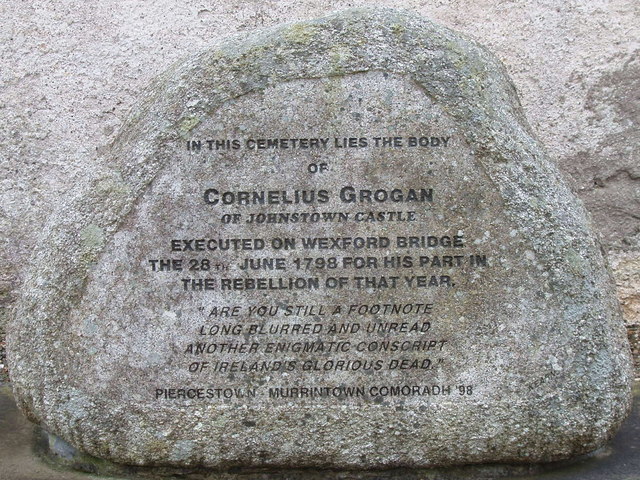|
John Henry Colclough
John Henry Colclough (c. 1769 – 28 June 1798) was United Irishman executed in Wexford following the Irish Rebellion of 1798. Life He was born circa 1769 into an old landowning Wexford family, the son of Thomas Francis Colclough and lived at Ballyteigue, Kilmore. He went abroad to study medicine and qualified as a doctor. On his return to Wexford he married Elizabeth Berry. He became involved in Irish nationalism, joined the United Irishmen and was arrested with Lord Edward Fitzgerald on 27 May 1798 and taken to Wexford gaol. From there he was sent with Fitzgerald to parley with the rebels at Vinegar Hill, returning alone to report negotiations had failed. He was later, somewhat reluctantly, in the company of the rebels at the Battle of New Ross. After the battle, and the royalists had regained the town, he fled with his wife and Bagenal Harvey to the Greater Saltee Island, from whence they planned to escape to republican France. They were betrayed under torture by a local f ... [...More Info...] [...Related Items...] OR: [Wikipedia] [Google] [Baidu] |
Society Of United Irishmen
The Society of United Irishmen was a sworn association in the Kingdom of Ireland formed in the wake of the French Revolution to secure "an equal representation of all the people" in a national government. Despairing of constitutional reform, in 1798 the United Irishmen instigated a republican insurrection in defiance of British Crown forces and of Irish sectarian division. Their suppression was a prelude to the abolition of the Protestant Ascendancy Parliament in Dublin and to Ireland's incorporation in a United Kingdom with Great Britain. An attempt to revive the movement and renew the insurrection following the Acts of Union was defeated in 1803. Espousing principles they believed had been vindicated by American independence and by the French Declaration of the Rights of Man, the Presbyterian merchants who formed the first United society in Belfast in 1791 vowed to make common cause with their Catholic-majority fellow countrymen. Their "cordial union" would upend Irel ... [...More Info...] [...Related Items...] OR: [Wikipedia] [Google] [Baidu] |
Cornelius Grogan
Cornelius Grogan (1738?–1798), was a United Irishman and commissary-general in the insurgent army of Wexford in the Rebellion of 1798. Biography Grogan was born about 1738, the eldest son of John Grogan of Johnstown Castle, Wexford, by his wife Catherine, daughter and heiress of Major Andrew Knox of Rathmacknee. His father, a Protestant landlord, was a member of the Parliament of Ireland. His mother was the heiress of a well-known Scots family, which produced two bishops of the Church of Scotland. Grogan succeeded to the family estates, was High Sheriff of Wexford for 1779 and was from 1768 to 1776 M.P. for Enniscorthy (his father's old seat) in the Irish parliament. He was a popular landlord, but due to failing health, he rarely left home in his last years. He never married. On the outbreak of the Irish rebellion of 1798, Grogan joined the insurgents (whether willingly or under compulsion was later the crucial issue at his trial), and became commissary-general in their ar ... [...More Info...] [...Related Items...] OR: [Wikipedia] [Google] [Baidu] |
People From County Wexford
A person ( : people) is a being that has certain capacities or attributes such as reason, morality, consciousness or self-consciousness, and being a part of a culturally established form of social relations such as kinship, ownership of property, or legal responsibility. The defining features of personhood and, consequently, what makes a person count as a person, differ widely among cultures and contexts. In addition to the question of personhood, of what makes a being count as a person to begin with, there are further questions about personal identity and self: both about what makes any particular person that particular person instead of another, and about what makes a person at one time the same person as they were or will be at another time despite any intervening changes. The plural form "people" is often used to refer to an entire nation or ethnic group (as in "a people"), and this was the original meaning of the word; it subsequently acquired its use as a plural form of ... [...More Info...] [...Related Items...] OR: [Wikipedia] [Google] [Baidu] |
People Executed By The British Military By Hanging
A person ( : people) is a being that has certain capacities or attributes such as reason, morality, consciousness or self-consciousness, and being a part of a culturally established form of social relations such as kinship, ownership of property, or legal responsibility. The defining features of personhood and, consequently, what makes a person count as a person, differ widely among cultures and contexts. In addition to the question of personhood, of what makes a being count as a person to begin with, there are further questions about personal identity and self: both about what makes any particular person that particular person instead of another, and about what makes a person at one time the same person as they were or will be at another time despite any intervening changes. The plural form "people" is often used to refer to an entire nation or ethnic group (as in "a people"), and this was the original meaning of the word; it subsequently acquired its use as a plural form of ... [...More Info...] [...Related Items...] OR: [Wikipedia] [Google] [Baidu] |


_1938.jpg)